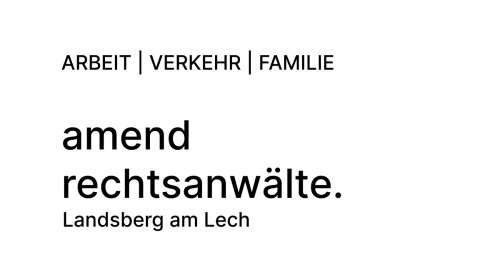Best Employment & Labor Lawyers in Landsberg am Lech
Share your needs with us, get contacted by law firms.
Free. Takes 2 min.
List of the best lawyers in Landsberg am Lech, Germany
Germany Employment & Labor Legal Articles
Browse our 1 legal article about Employment & Labor in Germany written by expert lawyers.
- Wrongful Dismissal in Germany: What to Do After Being Fired
- Most employees in Germany enjoy strong statutory protection, especially against unfair dismissal, under laws like the Civil Code (BGB) and Protection Against Dismissal Act (KSchG). You usually must act very fast after receiving a termination: you have only 3 weeks to file a claim at the labor court (Arbeitsgericht). Written... Read more →
About Employment & Labor Law in Landsberg am Lech, Germany
Employment and labor law in Landsberg am Lech, Germany, is governed by both federal regulations and local practices. These laws are designed to protect the rights of employees and employers, ensuring fair treatment, proper working conditions, and the smooth functioning of workplaces. Located in the state of Bavaria, Landsberg am Lech follows the legal framework established by German federal law, while also embracing certain regulations relevant to regional needs and practices. Labor law influences everything from hiring and contracts to workplace safety, terminations, and collective bargaining.
Why You May Need a Lawyer
There are many situations where individuals or businesses might need help from a legal professional specializing in employment and labor law. You may require a lawyer if you are facing wrongful termination, disputes over wages or working hours, or cases of discrimination at the workplace. Legal guidance is also crucial when drafting or reviewing employment contracts, handling redundancy or restructuring, or seeking advice on compliance with local regulations. Both employers and employees can benefit from understanding their rights and obligations, especially when dealing with conflicts, severance issues, or workplace harassment.
Local Laws Overview
Employment relations in Landsberg am Lech are subject to the German Civil Code (Bürgerliches Gesetzbuch), the Works Constitution Act (Betriebsverfassungsgesetz), and various statutes like the Minimum Wage Act and laws on protection against dismissal. Bavaria, as a federal state, may have specific provisions regarding public holidays, collective agreements, and vocational education standards. Key aspects include mandatory provisions on minimum wage, limits on working hours, rules on vacation and paid leave, strong protection against unfair dismissal, and requirements for workplace health and safety. In many local companies, works councils (Betriebsrat) play a significant part in representing employee interests.
Frequently Asked Questions
What rights do employees have regarding working hours in Landsberg am Lech?
German labor law generally limits the regular working day to eight hours, extendable to ten hours if compensatory rest is given within six months. Overtime rules and compensation may be specified in employment contracts or collective agreements.
How does the probationary period work?
A probationary period of up to six months is common. During this time, notice periods for termination are shorter, usually two weeks, unless otherwise agreed.
What is the minimum wage in Landsberg am Lech?
The federal minimum wage applies across Germany. As of 2024, it is set at 12.41 euros per hour, though some sectors may have higher rates according to collective agreements.
When can an employee be lawfully dismissed?
Dismissal must generally follow strict rules, including proper notice and a valid reason such as operational needs, misconduct, or personal inability. Termination protection laws apply after six months of employment in establishments with more than ten employees.
Are there specific protections against workplace harassment and discrimination?
Yes, the General Equal Treatment Act (AGG) prohibits discrimination based on race, religion, gender, disability, age, or sexual orientation, and employers have an obligation to prevent harassment in the workplace.
How much annual paid leave is an employee entitled to?
The statutory minimum is 20 working days per year for a five-day workweek, but many contracts and collective agreements offer more generous leave.
What role do works councils play?
Works councils represent employees in workplaces with at least five employees. They have participatory rights regarding working conditions, layoffs, and social matters, and can mediate in disputes.
Can an employer make changes to employment contracts unilaterally?
Significant changes such as reducing pay or increasing working hours typically require employee consent or the conclusion of a new contract. Employers cannot generally enforce such changes without agreement.
What steps can an employee take if they believe they have been unfairly treated or dismissed?
Employees can challenge dismissal or unfair treatment in the local labor court (Arbeitsgericht). It is important to act quickly, as there are strict deadlines, typically three weeks for filing a claim against dismissal.
How are employment disputes usually resolved?
Many disputes are first addressed through direct negotiation or via works councils or trade unions. If unresolved, matters can be taken to the local labor court, which offers a structured and often expedited process for resolving employment conflicts.
Additional Resources
- Federal Employment Agency (Bundesagentur für Arbeit): Offers job placement and advice for employees and employers. - Bavarian Ministry of Family, Labor and Social Affairs (Bayerisches Staatsministerium für Familie, Arbeit und Soziales): Provides information on labor law in Bavaria. - Local Chamber of Commerce and Industry (Industrie- und Handelskammer, IHK) for Munich and Upper Bavaria: First contact point for local businesses. - Trade unions such as ver.di or IG Metall: Offer support and legal consultation services for members. - The local Labor Court (Arbeitsgericht) in nearby Munich: Responsible for legal disputes from Landsberg am Lech.
Next Steps
If you need legal assistance with an employment or labor matter in Landsberg am Lech, start by gathering all relevant documents such as contracts, correspondence, and records of communication. Consider reaching out to a local lawyer specialized in employment law for an initial consultation. You may also contact your works council or trade union for support. For urgent matters like dismissals, act quickly to meet legal deadlines. Finally, refer to reputable resources listed above or seek advice from governmental agencies to understand your rights and options before proceeding.
Lawzana helps you find the best lawyers and law firms in Landsberg am Lech through a curated and pre-screened list of qualified legal professionals. Our platform offers rankings and detailed profiles of attorneys and law firms, allowing you to compare based on practice areas, including Employment & Labor, experience, and client feedback.
Each profile includes a description of the firm's areas of practice, client reviews, team members and partners, year of establishment, spoken languages, office locations, contact information, social media presence, and any published articles or resources. Most firms on our platform speak English and are experienced in both local and international legal matters.
Get a quote from top-rated law firms in Landsberg am Lech, Germany — quickly, securely, and without unnecessary hassle.
Disclaimer:
The information provided on this page is for general informational purposes only and does not constitute legal advice. While we strive to ensure the accuracy and relevance of the content, legal information may change over time, and interpretations of the law can vary. You should always consult with a qualified legal professional for advice specific to your situation.
We disclaim all liability for actions taken or not taken based on the content of this page. If you believe any information is incorrect or outdated, please contact us, and we will review and update it where appropriate.
Browse employment & labor law firms by service in Landsberg am Lech, Germany
Landsberg am Lech, Germany Attorneys in related practice areas.










